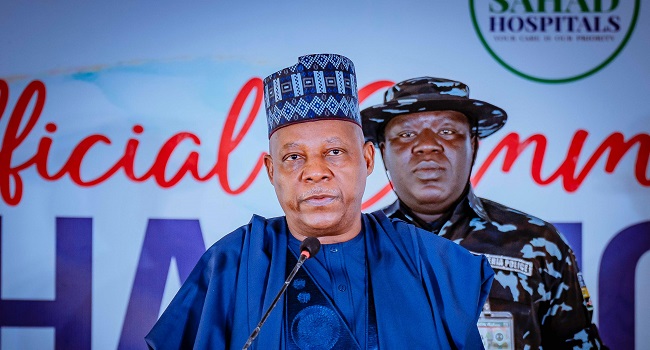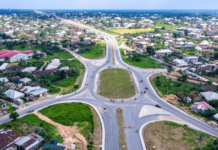In a move that underscores the Federal Government’s dedication to healthcare reform, Vice President Kashim Shettima announced that recent health sector reforms have attracted over $4.8 billion in potential investments. This significant achievement was highlighted during the commissioning and grand opening of Sahad Hospitals in Abuja, a major event that signals a new chapter in Nigeria’s healthcare journey.
 The Vice President’s announcement comes as part of President Bola Ahmed Tinubu’s broader strategy to revitalize Nigeria’s healthcare system. During the event, Shettima emphasized the government’s commitment to overcoming the long-standing challenges that have hindered the health sector for decades. According to Shettima, “Our health sector calls upon us all to unite. The promise of this day is one we cannot overlook. It is through such collaboration and shared dedication that we can guarantee every Nigerian receives the care and support they deserve.”
The Vice President’s announcement comes as part of President Bola Ahmed Tinubu’s broader strategy to revitalize Nigeria’s healthcare system. During the event, Shettima emphasized the government’s commitment to overcoming the long-standing challenges that have hindered the health sector for decades. According to Shettima, “Our health sector calls upon us all to unite. The promise of this day is one we cannot overlook. It is through such collaboration and shared dedication that we can guarantee every Nigerian receives the care and support they deserve.”
The health sector reforms, as outlined by Shettima, are grounded in a robust roadmap. This roadmap is designed to address and resolve persistent issues that have been detrimental to the efficiency and effectiveness of healthcare delivery in Nigeria. Shettima detailed the ambitious nature of these reforms, stating, “This Administration’s ambitious health sector reforms, which have already attracted over $4.8 billion in potential investments, signal a strong commitment to revitalizing our healthcare system.”
Central to the government’s reform strategy are four key pillars: transforming healthcare governance, improving population health outcomes, unlocking the healthcare value chain, and strengthening health security. These pillars are not mere buzzwords but represent a comprehensive approach to reforming the healthcare system at all levels. By focusing on governance, the government aims to implement policies that ensure accountability, transparency, and efficiency in the management of healthcare resources. Improving population health outcomes involves not only providing better healthcare services but also addressing social determinants of health that affect the well-being of Nigerians.
Shettima also highlighted initiatives spearheaded by the Minister of Health and Social Welfare, Prof. Muhammad Ali Pate. These initiatives include boosting domestic production of essential medical supplies and drugs and doubling the number of fully functional primary healthcare centers across the nation. “We have set out to achieve this by boosting domestic production of essential medical supplies and drugs, and by strengthening primary healthcare through the doubling of fully functional centers across the nation,” Shettima explained. These initiatives are aimed at reducing dependency on imported medical supplies and enhancing the availability and accessibility of healthcare services, particularly in rural areas.
While outlining the government’s vision for a reformed healthcare sector, Shettima did not shy away from acknowledging the challenges that remain. He expressed concern over the rising costs of medicines, long waiting times in hospitals, and a critical shortage of healthcare workers. “Nigerians continue to grapple with pressing healthcare challenges, such as surging costs of medicines, long hospital waiting times, and a shortage of health workers,” he noted. These issues, he stressed, are compounded by the ongoing brain drain, where qualified medical professionals seek better opportunities abroad, leaving a gap in the local healthcare workforce.
The Vice President emphasized that the success of the healthcare reforms largely depends on the involvement of the private sector. He underscored the importance of private sector participation in complementing government efforts, stating, “Our private sector is a critical part of the solution, especially in the face of the long-standing brain drain among our medical workforce. Investing in the health sector engages the talents and skills of our citizens, generating numerous job opportunities for graduates and technicians. This is a notable aspect of our national development narrative.”
Shettima further revealed that the National Economic Council (NEC), under his leadership, has made the development of Nigeria’s human capital a top priority, with a special focus on health and nutrition. He stressed that every state governor is committed to this cause, recognizing that investment in healthcare is essential for the nation’s growth and prosperity. “Each of our state governors is fully on board. We have all acknowledged that no nation can optimize its opportunities without investing in its healthcare, and for us, this is only the beginning,” he assured.
Reaffirming the administration’s dedication to this cause, Shettima stated, “We welcome this intervention, not just because it aligns with the agenda of President Bola Ahmed Tinubu, who has demonstrated his commitment to unlocking Nigeria’s healthcare value chain, but also because of its far-reaching implications for our national development. We stand prepared to move forward together into the future, and I assure you that the government will continue to be your steadfast partner in this effort to serve the nation and humanity, with full support to achieve our shared goals.”
The Vice President took a moment to commend Alhaji Ibrahim Mijinyawa, Chairman and Founder of Sahad Group of Companies, for his significant contributions to healthcare and philanthropy. Shettima described Mijinyawa as a reputable businessman whose efforts have had a positive impact on the lives of many Nigerians. He recounted how he intervened when Sahad Stores Ltd was shut down by the Federal Competition and Consumer Protection Commission (FCCPC). “When the FCCPC locked up his store, I had to call the head of the agency to say, ‘Please, reopen the store before you come and tell me what happened’. I did so because I know how helpful Sahad Stores is to many Nigerians,” Shettima shared.
He praised Mijinyawa’s decision to use his wealth for the benefit of others, highlighting his philanthropic spirit. “He has used his business to touch many lives. If he was a selfish man, he would have kept his money to himself and his children and grandchildren alone, because he has enough to take care of himself till he leaves this world. But he has decided to continue helping humanity. I had so many engagements scheduled for this weekend but had to appeal to them that I can’t attend their events because I feel we should support such a person that is working for the cause of humanity. We all need to support him,” the Vice President added.
The event also featured remarks from other notable figures who acknowledged the importance of private sector contributions to healthcare. Senator Barau Jibrin, the Deputy Senate President and Chairman of the occasion, expressed his gratitude to Alhaji Mijinyawa for his dedication to philanthropy and quality healthcare services for the less privileged. Represented by Senator Garba Musa Maidoki, Senator Jibrin highlighted the expectation that Sahad Hospitals would cater to both high and low-income Nigerians. He urged the hospital authorities to collaborate with NGOs that finance medical services for the less privileged, ensuring that displaced and vulnerable individuals have access to healthcare facilities.
Dr. Tunji Alausa, Minister of State for Health and Social Welfare, also commended Alhaji Mijinyawa, stating that the establishment of the 200-bed Sahad Hospital marked a new chapter in Nigerian healthcare. He pointed out that this initiative exemplifies what can be achieved when public-spirited individuals invest in the health of their fellow citizens. “The commissioning of the 200-bedded Sahad Hospital is a testament to the unwavering commitment of a private citizen,” Dr. Alausa remarked, noting that the challenges facing healthcare services today require innovative solutions from both the government and private sector.
Dr. Shamsuddeen Aliyu, Vice Chairman of Sahad Hospital, provided insights into the new facility, describing it as a state-of-the-art hospital dedicated to delivering quality healthcare. He emphasized that the hospital is more than just a building; it represents a commitment to a vision where everyone has access to comprehensive and compassionate care. The hospital, equipped with seven operating theatres, 13 dialysis machines, and 10 ICU beds, is designed to meet the needs of patients and provide top-notch medical services.
“Our team has worked tirelessly to ensure that every aspect of the hospital—from the design to equipment—is centered around patients’ needs,” Dr. Aliyu stated. This dedication to patient care reflects a broader commitment to upholding the well-being of the community and advancing healthcare standards in Nigeria.
The announcements and commitments made at the commissioning of Sahad Hospitals underscore the collaborative effort needed to transform Nigeria’s healthcare sector. With the government, private sector, and philanthropic individuals working together, there is a renewed sense of optimism for the future of healthcare in Nigeria. As the Federal Government continues to implement its ambitious reforms, supported by substantial investments and a clear strategic vision, the goal of providing accessible, quality healthcare to all Nigerians moves closer to becoming a reality.




